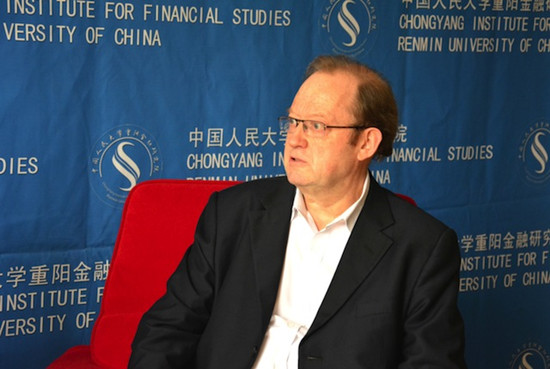国际货币基金组织曾预测,中国的经济规模预计在2017或2018年超越美国。不过,随着今年上半年中国经济增长的放缓,有分析认为这一“时间表”可能会延后。近日,人大重阳网就此问题专访了前伦敦经济与商业政策署署长、中国人民大学重阳金融研究院(以下称“人大重阳”)高级研究员约翰•罗思义(John Ross),他认为,中国超越美国的脚步并未放缓,有望于2019年实现。

前伦敦经济与商业政策署署长、中国人民大学重阳金融研究院高级研究员约翰•罗思义接受我院记者采访

罗思义认为,中国超越美国的脚步并未放缓,有望于2019年实现。
人大重阳网消息
国际货币基金组织曾预测,中国的经济规模预计在2017或2018年超越美国。不过,随着今年上半年中国经济增长的放缓,有分析认为这一“时间表”可能会延后。近日,人大重阳网就此问题专访了前伦敦经济与商业政策署署长、中国人民大学重阳金融研究院(以下称“人大重阳”)高级研究员约翰•罗思义(John Ross),他认为,中国超越美国的脚步并未放缓,有望于2019年实现。
“中国超越美国并没有放缓脚步”
人大重阳网:随着中国经济增长的放缓、美国经济的复苏,中国超越美国的几率是否有所减少?
罗思义:我并不这样认为。因为美国的经济增长也在放缓。国际货币基金组织最新发布的《世界经济展望》预测,如果以购买力平价为基准计算相对价格,中国经济会在2017或2018年超越美国经济。IMF同时预测中国的经济将以8.4%的速度增长,而美国的增速则维持在3%。
从目前来看,中国的经济增速可会低于8.4%这个水平,甚至回落到7%。但美国的情况也不乐观:参照美国过去二十年的数据,其平均增长率为2.6%;如果参照美国过去十年的数据,其平均增长率仅为1.7%。按照这个趋势,美国的经济增长率也很难高于IMF预测的3%。所以对于中国何时会在经济规模上超过美国这一问题的答案,我认为不是由哪个国家单方面决定的,它不仅取决于中国的经济增长速度,也同时取决于美国的经济增长速度。中国经济增速虽然放缓,但超越美国并不是一个很大的挑战。我预测,7月份公布的二季度经济数据中,美国经济增长率会在2%左右,而中国则会维持在7.5%,二者之差为5.5%,比IMF之前公布的5.4%还要稍微高一些。所以中国经济增速的放缓,并没有对中国追赶美国造成太大的影响。
人大重阳网:许多媒体认为,中国的经济增长很大程度上是由投资拉动的。你怎么看待这一现象?
罗思义:依靠投资拉动经济毋庸置疑。从世界范围来看,投资是拉动经济增长的最重要力量。在1990年到2010年的世界GDP增长中,53%是由于投资的拉动,18%源自资本和劳动生产率的增加,30%来自劳动力的增长。这一数据见于姜武(音译;Khuong Vu)的新书The Dynamics of Economic Growth: Policy Insights from Comparative Analyses in Asia(《经济增长动力:亚洲比较分析的政策解读》)。中国经济的确是由投资拉动的,毕竟每一个经济体的增长都是由投资拉动的。
“中国经济规模有望在2019年超越美国”
人大重阳网:你认为中国赶超美国是否有一个具体的时间表?
罗思义:有一种相对容易的测算方法,即以购买力平价(PPPs)为基准计算相对价格。
要想理解为什么西方经济学家更倾向于采用国际比较价格而不是汇率来预测中国的经济规模,我们首先必须清楚人民币汇率低估了中国的经济规模。比如,一瓶可乐在伦敦需要5元,而在中国则需要2.5元,但这显然不是说一瓶可乐在伦敦的价值就比在中国的价值高。我们从可乐的例子就可以看出,官方汇率明显被低估了。世界银行通过统计多种产品,得出了一个综合购买力平价来衡量中国的经济。通过计算购买力平价,会很容易预测出中国经济将在2017至2019年超越美国。
那么,如果考虑市场汇率,中国何时才能成为最大的经济体呢?中国经济何时能够超越美国?除了取决于经济发展增长本身之外,还取决于人民币的汇率,但是没有人能够准确预测汇率的波动。所以,以市场汇率计价,中国成为世界第一大经济体的时间要稍晚于以购买力平价计价的时间——不会是很长的一段时间,但肯定会比以购买力平价计价的时间要晚一点。(人大重阳风迅、元帅青记录整理)
以下是英文采访原文:
Q: Since the increase of China’s economy has been slowing down while the US is recovering from it’s financial crisis, do you think this would cause lower chance for China to overtake the US?
A: No, because the US’s economy is slowing down as well. Let me illustrate this. If you take the IMF projections, in its latest World Economic Outlook, it predicts China’s economy will become larger than the US’s economy, in comparable prices (parity purchasing powers – PPPs) in 2017/18. The assumption the IMF made is that China’s economy will grow at 8.4% and the US economy will grow at 3%.
It’s possible that China’s economy will grow more slowly than 8.4%, but the US economy will not grow at 3% either. It you take the US average growth rate in the last 20 years, it’s only 2.6%. And if you take the US average growth rate in the last 10 years, it’s only 1.7%. Therefore, China may grow more slowly than the IMF’s predictions, but the US is also going to grow more slowly than the IMF’s predictions.
As when China will overtake the US, depends not only on the grow rate of China’s economy but also the growth rate of the US economy. The relative growth rate of the two economies, which fundamentally determines when China overtakes the US, is therefore not significantly altered. My estimate is when the 2nd quarter US GDP figures get published in July, it will come about as 2% while China as we know is 7.5%. So that means the growth gap will be around 5.5%, which is actually slightly larger than the IMF’s growth gap of 5.4%.
The slowing down of China’s economy is not making any difference to when it overtakes the US as the US economy is also slowing down.
Q: But a lot of media in China say that the China’s economy is driven by the investment, which is very huge. What do you think of this?
A: It is a matter of fact that economies are driven by investment – it is easily the largest components of world economic growth! If you look at world GDP growth in the period 1990-2010, 53% of the world GDP growth is due to investment, 18% to capital and labor productivity growth and 30% to labor growth - the full data can be found in an important new book by Khuong Vu ``The Dynamics of Economic Growth: Policy Insights from Comparative Analyses in Asia ``.
Yes, certainly China’s economy is driven by the investment because every economy in the world is driven by the investment!
Q: Do you have the timetable about when China will catch up with the US?
A: Well there are two ways to measure that. The first one is to calculate in the comparable prices – technically known as parity purchasing powers (PPPs). That is relatively easy.
To understand why Western economists prefer use internationally comparable prices, rather than market exchange rates, for such calculations it is simply necessary to note that the RMB’s market exchange rate understates the size of China’s economy.
Let me give a very simple example to illustrate this. A can of diet coke costs me the equivalent of 5 yuan in London, while in China it is 2.5 yuan. But it’s stupid to say that a can of diet coke in London has really twice the value of a can of diet coke in China because they are exactly the same product. What it tells you is that official market exchange rate, as measured in diet coke, is undervalued.
The World Bank does similar calculations for a much wider range of products to come up with a parity purchasing power (PPP) measure for the size of China’s economy. If you do the calculation of PPPs, it’s easy to calculate that China will be the largest economy in the world sometime between 2017 and 2019.
There is a second question however – when will China become the world’s largest economy at market exchange rates? That depends not only on economic growth but also on the RMB exchange rate. Nobody can entirely accurately predict the exchange rate – if they could, by their operations in the foreign exchange markets they would easily become the world’s richest person! So China becoming the world’s largest economy at market exchange rates will be somewhat after it is the world’s largest economy in real terms –not a huge period of time, but definitely with some delay.